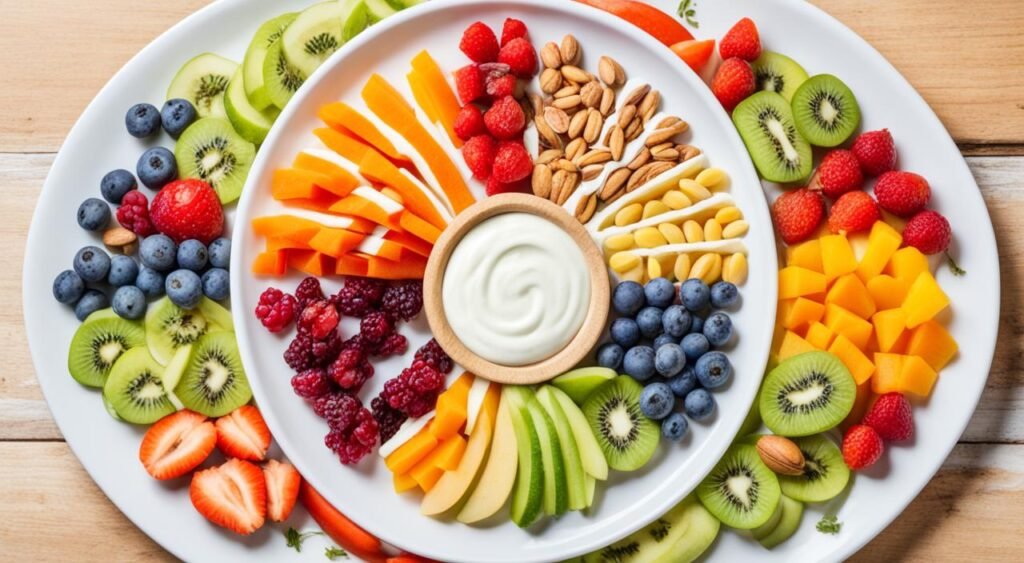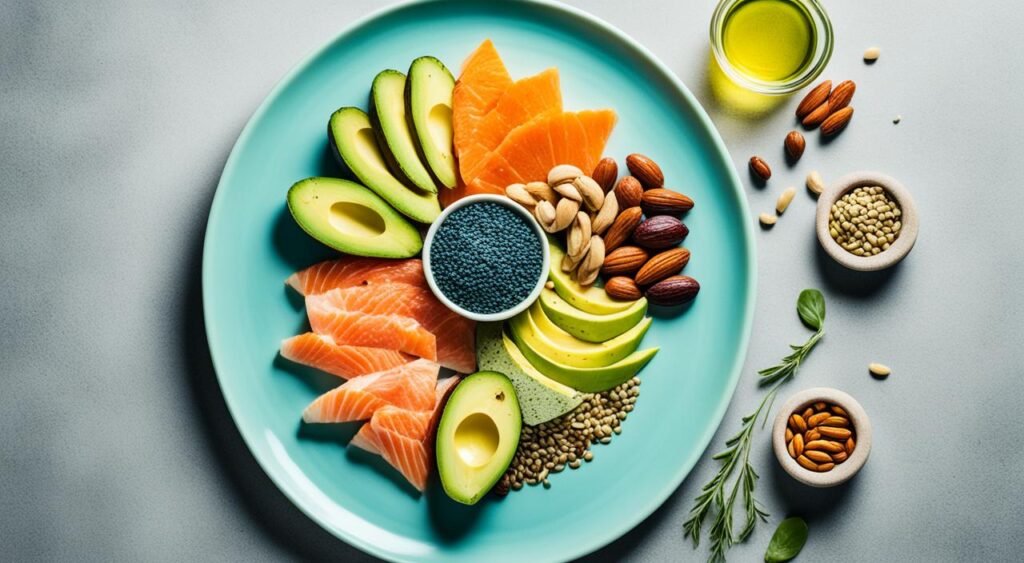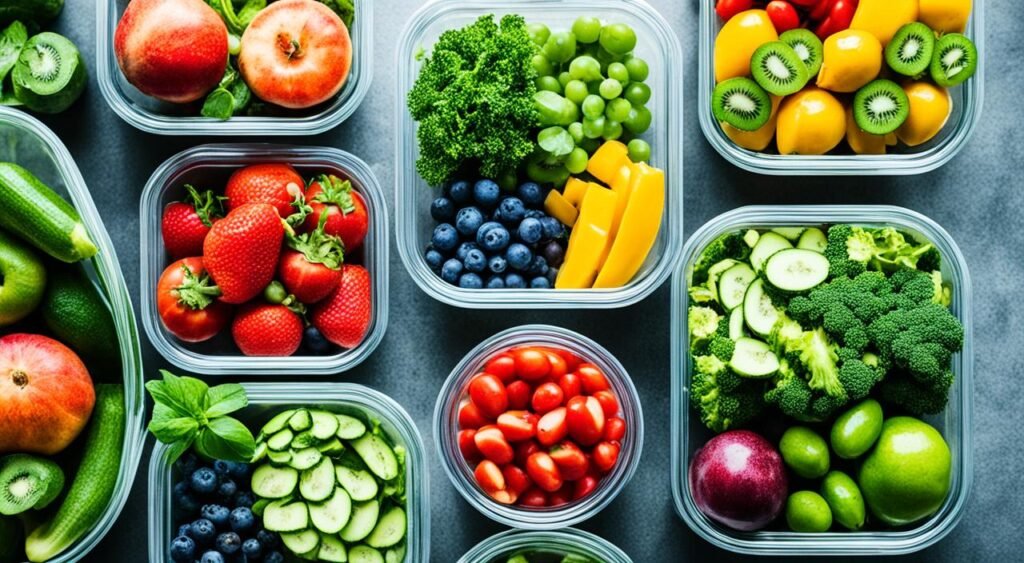Diet plan To Gain Weight : Gaining weight can be tough, just like losing it. It’s key to up your energy and protein while eating well. This 7-day shows how to eat more calories from healthy foods like lean meat, dairy, eggs, seeds, and nuts. These foods help you enjoy eating and help you reach your . If you have health concerns, talk to a doctor before changing your diet.
Key Takeaways
- Gaining weight requires a calorie surplus and focusing on nutrient-dense foods.
- A balanced diet with a mix of macronutrients is essential for healthy weight gain.
- Incorporating healthy fats and high-protein foods can support muscle growth.
- Meal prepping and consistent snacking can help increase calorie intake.
- Staying active while gaining weight is important for overall health.
Understanding the Basics of Weight Gain
Gaining weight can be for many reasons, like building muscle or recovering from illness. The key is to have a calorie surplus. This means eating more calories than you burn. This surplus gives your body the energy to gain weight, mainly muscle.
Calorie Surplus for Weight Gain
To gain weight, eat more calories than your body burns. It’s important to know how many calories you need. This helps you plan a healthy weight gain.
By figuring out your calorie needs, you can eat enough to gain weight safely. This lets your body add the weight you want, like muscle.
The Role of Macronutrients
Protein, carbohydrates, and fats are key for gaining weight and building muscle. Protein helps fix and grow muscle. Carbs give you energy. Fats help with hormone production and getting nutrients.
Getting the right mix of these in your diet helps you gain weight in a healthy way.
| Macronutrient | Function | Ideal Intake Range |
|---|---|---|
| Protein | Muscle repair and growth | 0.8-1.2 g per pound of body weight |
| Carbohydrates | Energy provision | 45-65% of total caloric intake |
| Fats | Hormone production, nutrient absorption | 20-35% of total caloric intake |
“To gain weight, you need to consume more calories than your body burns, known as a calorie surplus. The macronutrients – protein, carbohydrates, and fats – all play important roles in weight gain and muscle growth.”
7-Day Weight Gain Meal Plan

Want to gain a few pounds? This 7-day meal plan is here to help. It’s packed with foods that are both nutrient-dense and calorie-dense. These meals give you about 2,500 calories a day. This is ideal for gaining 1-2 pounds a week safely.
This plan includes lean proteins, complex carbs, healthy fats, fruits, and veggies. It’s designed to feed your body while helping you gain weight. You’ll get breakfast, lunch, dinner, and snack ideas that are easy to prep ahead. You can adjust the calories to 3,000 or 2,000 based on your activity level and goals.
7-Day Weight Gain Meal Plan
| Day | Breakfast | Lunch | Dinner | Snack |
|---|---|---|---|---|
| 1 | Oatmeal with peanut butter, banana, and almonds | Grilled chicken sandwich with avocado and whole-grain bread | Baked salmon, quinoa, and roasted vegetables | Greek yogurt with granola and berries |
| 2 | Eggs scrambled with cheese and whole-grain toast | Turkey and cheese wrap with hummus and carrot sticks | Beef and broccoli stir-fry with brown rice | Cottage cheese with apple slices and cinnamon |
| 3 | Pancakes with almond butter and sliced bananas | Tuna salad on a bed of mixed greens with whole-grain crackers | Baked sweet potato stuffed with black beans, avocado, and cheese | Trail mix with nuts, seeds, and dried fruit |
| 4 | Veggie omelet with whole-grain toast and a side of sliced mango | Grilled chicken Caesar salad with whole-grain croutons | Beef and vegetable stew with crusty whole-grain bread | Edamame with sea salt |
| 5 | Overnight oats with chia seeds, peanut butter, and berries | Lentil and quinoa bowl with roasted sweet potatoes and avocado | Baked chicken thighs, roasted potatoes, and steamed broccoli | Greek yogurt parfait with granola and sliced kiwi |
| 6 | Breakfast burrito with scrambled eggs, cheese, and sautéed vegetables | Grilled salmon salad with mixed greens, quinoa, and avocado | Beef and broccoli stir-fry with brown rice | Peanut butter and banana on whole-grain toast |
| 7 | Oatmeal with almond butter, sliced bananas, and walnuts | Tuna and avocado lettuce wraps with whole-grain crackers | Baked chicken thighs, roasted sweet potatoes, and sautéed spinach | Cottage cheese with mixed berries and a drizzle of honey |
This 7-day meal plan is just the start. Adjust the portions and calories to fit your own weight gain goals. Remember to keep your diet balanced and nutritious. Regular meal prepping and exercise can also help you reach your weight goals.
Maximizing Nutrition for Weight Gain

When you want to gain weight, focus on whole foods that are both nutrient-dense and calorie-rich. Avoid just eating high-calorie foods that are bad for you. Eating a mix of different foods can help you get the most nutrition from your diet.
Nutrient-Dense Foods for Weight Gain
Lean proteins, whole grains, fruits, vegetables, nuts, seeds, and healthy fats are great for gaining weight. They give you vitamins, minerals, fiber, and antioxidants, along with the calories you need. This way, you build muscle and stay healthy, not just gain fat.
- Lean proteins: Chicken, turkey, lean beef, fish, eggs, Greek yogurt
- Whole grains: Brown rice, quinoa, oats, whole wheat bread
- Fruits and vegetables: Bananas, avocados, dried fruit, potatoes, leafy greens
- Nuts and seeds: Almonds, peanuts, chia seeds, flaxseeds, pumpkin seeds
- Healthy fats: Olive oil, avocado, nuts, nut butters, fatty fish
Adding these foods to your diet can help you gain weight in a healthy way. It also supports your overall health and wellness.
“Focusing on nutrient-dense whole foods is the key to gaining weight in a healthy, sustainable way.”
Incorporating Healthy Fats

Healthy fats are key for gaining weight. They give you lots of calories and help with health. Adding healthy fats to your diet, along with proteins and carbs, makes a great plan for gaining weight.
Great fat sources include monounsaturated fats in avocados, nuts, and olive oil. Also, polyunsaturated fats from fatty fish, seeds, and walnuts are good. These healthy fats fit well in meals, are great for cooking, or make tasty calorie-dense snacks.
| Healthy Fat Source | Nutrient Profile |
|---|---|
| Avocado | High in monounsaturated fats, fiber, and various vitamins and minerals. |
| Nuts (almonds, cashews, peanuts) | Rich in monounsaturated and polyunsaturated fats, protein, and essential nutrients. |
| Olive Oil | Abundant in monounsaturated fats, antioxidants, and anti-inflammatory properties. |
| Fatty Fish (salmon, mackerel, sardines) | High in polyunsaturated omega-3 fatty acids, protein, and various vitamins and minerals. |
Adding these healthy fats to your meals and snacks helps with weight gain. It also boosts your health and happiness. By choosing wisely and balancing your diet, you can gain weight in a healthy way.
Building Muscle with Protein

Protein is key for gaining weight and building muscle. It helps repair and grow muscle tissue. This makes it vital for any weight gain or bodybuilding plan.
High-Protein Foods for Muscle Growth
To help muscles grow, eat a mix of protein-rich foods. Great sources of lean protein are:
- Lean meats (chicken, turkey, lean beef, pork)
- Fish and seafood (salmon, tuna, shrimp, etc.)
- Eggs and dairy products (milk, yogurt, cheese)
- Legumes (beans, lentils, chickpeas)
- Protein powders and supplements
These protein-rich foods give your body what it needs to repair and build muscle tissue. This helps you gain weight and muscle mass. Make sure to eat more calories and do strength training too.
| Food | Protein Content (per serving) |
|---|---|
| Grilled Chicken Breast | 54g |
| Salmon Fillet | 34g |
| Eggs (2 large) | 12g |
| Greek Yogurt (1 cup) | 23g |
| Lentils (1 cup cooked) | 18g |
Eat these high-protein foods and follow a structured weight-gain and muscle-building plan. This will help your body grow muscles and gain weight effectively.
diet plan to gain weight

Gaining weight means focusing on a diet full of nutrients. A good diet plan should give you more calories than you burn. It should also have the right mix of proteins, carbs, and fats. Eating foods that are high in calories and whole can help your body grow and stay healthy.
We’ve made a 7-day meal plan with about 2,500 calories a day to help you gain weight. You can change it if you need more or fewer calories, based on how active you are and your goals.
Meal Plan Overview
- Focus on foods rich in nutrients and calories, like lean proteins, complex carbs, and healthy fats.
- Balance of macronutrients to help muscles grow and support weight gain.
- Choose meals that fit your taste and any food limits you have.
- Prepping meals ahead is a good idea for easy and consistent eating.
| Day | Breakfast | Lunch | Dinner | Snacks |
|---|---|---|---|---|
| 1 | Oatmeal with peanut butter and banana | Grilled chicken, brown rice, and steamed broccoli | Baked salmon, sweet potato, and roasted vegetables | Greek yogurt with granola, dried fruit |
| 2 | Scrambled eggs with whole-grain toast and avocado | Turkey and cheese sandwich on whole-wheat bread, apple | Beef stir-fry with mixed vegetables and quinoa | Trail mix, mixed nuts |
| 3 | Smoothie with milk, banana, peanut butter, and spinach | Grilled chicken Caesar salad with whole-grain croutons | Baked chicken, roasted potatoes, and sautéed kale | Cottage cheese with berries |
This meal plan is just a starting point. You can change it to fit your likes and needs. The main idea is to eat foods that are full of nutrients and calories. This helps you gain weight in a healthy way, improving your health and well-being.
Snacking Strategies for Weight Gain

Snacking can help you gain weight. By choosing snacks that are high in calories and nutrients, you can increase your calorie intake. This supports your body’s need for weight gain. Look for snacks that are full of calories, healthy fats, complex carbs, and protein.
Calorie-Dense Snack Options
For weight gain snacks, focus on snacks that are high in calories but still nutritious. Great choices include:
- Nuts and nut butters: Almonds, peanuts, cashews, and their creamy nut butter counterparts are packed with healthy fats and calories to fuel your weight gain efforts.
- Dried fruit: Raisins, apricots, and other dried fruits offer a concentrated source of natural sugars and carbohydrates to complement your high-calorie diet.
- Granola and trail mixes: These crunchy, calorie-dense snacks combine complex carbs, healthy fats, and protein to keep you energized and satisfied.
- Smoothies: Blend together high-calorie ingredients like full-fat dairy, nut butters, and bananas for a nutrient-dense, calorie-rich beverage.
- Full-fat dairy products: Enjoy Greek yogurt, cheese, and whole milk to increase your intake of satiating protein and healthy fats.
When picking snacks, try to mix calorie-dense options with nutrient-rich fruits, vegetables, or other healthy foods. This makes your snacks more balanced and satisfying. It also helps you meet your weight gain goals.
| Snack | Calories | Macronutrients |
|---|---|---|
| 1 ounce of almonds | 160 calories | 14g fat, 6g carbs, 6g protein |
| 2 tablespoons of peanut butter | 190 calories | 16g fat, 7g carbs, 8g protein |
| 1/2 cup of dried mango | 260 calories | 66g carbs, 2g protein |
| 1 cup of full-fat Greek yogurt | 220 calories | 10g fat, 9g carbs, 20g protein |
Adding these calorie-dense, nutrient-rich snacks to your daily routine can help you gain weight. It also supports your overall health and wellness.
Meal Prepping for Consistency

Meal prepping is key for gaining weight. It means preparing calorie-rich meals ahead of time. This way, you get the right amount of calories and macronutrients your body needs for healthy weight gain. It also saves time and helps you stay consistent, which is important for gaining weight.
With meal prepping, you always have healthy, high-calorie options ready. This helps you avoid eating less healthy foods. By spending a few hours on the weekend, you can make meals and snacks for the whole week. This ensures you eat the right amount of calories and nutrients to support your weight gain.
Meal prepping also saves time and helps you eat better. Having a plan means you won’t make quick, unhealthy food choices. This kind of meal planning and prep is key for keeping your weight gain on track.
Adding meal prepping to your routine can really help if you want to gain weight in a healthy way. By planning and preparing your meals ahead, you make sure your body gets the nutrients and calories it needs for your weight gain goals.
Staying Active While Gaining Weight
When you want to gain weight, eating more calories is key. But, staying active is just as crucial for a healthy weight gain. Regular exercise helps grow muscles, boosts your metabolism, and keeps body fat in check.
Strength training is great for gaining weight. It makes your muscles work harder, which helps you gain weight in a healthy way. Doing exercises that work out big muscle groups is a smart move.
- Compound exercises like squats, deadlifts, and bench presses can help build muscle mass.
- Resistance training with weights or resistance bands can also be effective for muscle growth.
- Aim for 2-3 strength training sessions per week, allowing for adequate rest and recovery between sessions.
Cardio exercises, like walking fast, running, or swimming, help keep your metabolism up. This ensures you’re not just gaining fat. Finding the right mix of strength and cardio exercises helps you gain weight the right way.
| Exercise Type | Benefits for Weight Gain |
|---|---|
| Strength Training | Stimulates muscle growth, contributing to overall weight gain |
| Cardiovascular Exercise | Supports a healthy metabolism, preventing excess body fat accumulation |
Talking to a fitness expert can help you make a workout plan that fits your goals. They can mix strength, cardio, and rest to help you progress well. gain weight fast may help amount of weight , calories and protein may be beneficial best for weight gain. plan for healthy weight management diet and lifestyle , fruit for weight gain is healthy diet plan. best foods to gain weight 1 medium one tablespoon calories daily build lean muscle mass for women and men increased muscle times per week or hundred calories per day.
Adding regular exercise to your weight gain plan makes sure you’re doing it in a healthy way. This approach helps you reach your weight goals safely and effectively.
Also Read: What Is The Paleo Diet, And What Are Its Benefits?
Conclusion
Gaining a healthy weight needs a full plan that covers eating right and staying active. Learning about calorie surplus, macronutrient balance, and eating nutrient-dense foods is key. This article’s 7-day meal plan gives you a structured way to eat more calories and nutrients through balanced meals and snacks. It also lets you adjust to your own needs.
Adding physical activity, especially strength training, is vital for building muscle and helping with weight gain. Meal prepping and planning make sticking to your diet easier. Remember, success comes from being patient, persistent, and flexible as you gain weight in a healthy way.
With nutritious foods, good meal planning, and an active life, you can start a weight gain journey that boosts your health and looks. Embrace the journey, celebrate your progress, and enjoy being healthier and stronger.
FAQs
Q: What is a simple diet plan for weight gain?
A: A simple diet plan for weight gain involves consuming more calories than you burn, focusing on nutrient-dense foods, and incorporating foods high in protein and healthy fats.
Q: What foods should I eat to gain weight?
A: Foods like nuts, nut butter, avocado, whole grains, lean protein sources, and dairy products are beneficial for weight gain as they are calorie-dense and packed with nutrients.
Q: How many calories per day should I consume if I’m trying to gain weight?
A: The number of calories you should consume per day to gain weight depends on factors like your current weight, activity level, and metabolism. A general guideline is to eat around 500-1000 calories more than your maintenance level.
Q: Can a high-protein diet help me gain weight?
A: Yes, a high-protein diet can aid in weight gain as protein is essential for muscle growth and repair. Including ample protein in your diet can help you build muscle mass as you gain weight.
Q: What are the best foods to include in a weight gain diet?
A: The best foods for a weight gain diet include lean proteins like chicken and fish, healthy fats like avocados and olive oil, complex carbohydrates like whole grains and legumes, and calorie-dense foods like nuts and seeds.
Q: How can I increase my weight if I am underweight?
A: To increase weight if you are underweight, focus on consuming calorie and nutrient-rich foods, eating regular meals and snacks, and possibly seeking guidance from a healthcare professional or dietitian.
Q: Is there a specific eating plan for weight gain that I can follow?
A: Yes, a diet plan for weight gain typically includes a combination of high-calorie foods, adequate protein intake, and a balance of healthy fats and carbohydrates to support weight gain in a healthy manner.
